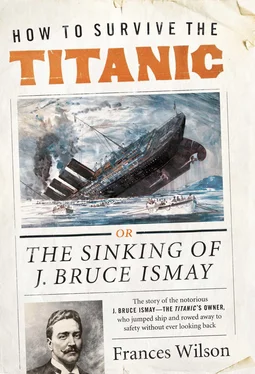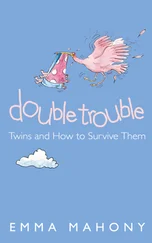Ismay then sent two further Marconigrams which Franklin received one after another between 8.00 and 8.44 a.m. on Thursday 18 April:
Think most unwise keep Titanic crew until Saturday. Strongly urge detain Cedric sailing her midnight, if desirable. Yamsi
Unless you have a good and sufficient reason for not holding Cedric, please arrange to do so. Most undesirable have crew New York so long. Yamsi.
Only in his next message, also sent that day, did Ismay mention his wife and answer the question Franklin had asked several Marconigrams earlier:
Widener not aboard. Hope to see you quarantine. Please cable wife am returning Cedric. Yamsi.
Franklin’s frantic response, despatched at 4.45 that afternoon, read:
Concise Marconigram of actual accident greatly needed for enlightenment public and ourselves. This most important. Franklin.
Neither he nor the public would be enlightened until the Carpathia reached New York at 9 o’clock that night. It was Captain Rostron’s decision to ensure that messages to and from the families of Titanic survivors were given priority, to allow no account of the disaster to be transmitted by Marconigram and to ignore requests from the press for further details. It was assumed on shore that the embargo on information had been enforced by Ismay.
The US Navy, picking up ‘Yamsi’s’ messages to Franklin, forwarded them to Senator William Alden Smith in Washington. Glancing over their contents, the Senator made an appointment to see President Taft to arrange that Ismay and other key witnesses be prevented from absconding, and Taft ordered that a Treasury Revenue cutter intercept the Carpathia before she docked. It seemed wisest, Senator Smith argued, to begin the inquiry into the wreck of the Titanic in New York where the witnesses could all for the moment be found, and then remove it to the capital where the witnesses could be under the jurisdiction of the Senate. In reply to the question of whether he was going to arrest J. Bruce Ismay, the Senator told journalists that ‘We not going into this matter with a club. We will proceed cautiously and conservatively.’ 34On Thursday evening, William Alden Smith and his colleague, Senator Newlands, waited at the Cunard Pier for the Carpathia to arrive.
The days spent on the Carpathia were suspended in a time of their own. In a private account of the wreck written for his scrapbook, the tennis champion Karl Behr, who had lost none of his party, wrote that ‘although the sinking of the Titanic was dreadful, to my mind the four days among the sufferers on the Carpathia was much worse and more difficult to try and forget’. 35While babies howled for their absent mothers, mothers wept for their dead children and wives grieved for their husbands, Marian Thayer was reunited with her son, Jack, whom she had imagined drowned, and the two socialites, Edith Russell and Lady Duff Gordon, who had lost nothing other than several trunks of couture, joked that ‘pannier skirts and Robespierre collars were at a discount in mid-ocean’. Friendships formed, perspectives on the fatal night’s events were pulled together, and rumours commenced. The main topic of conversation between the women in first-class was the survival of Bruce Ismay, currently being cared for by the doctor in his private cabin.
On the morning of Wednesday 17 April, while Ismay was writing his Yamsi telegrams, a first-class passenger, Emily Ryerson, let it be known to her friends that at 5 o’clock on Sunday afternoon she had been persuaded by Marian Thayer to take some air. Mrs Thayer had been returning, with her husband and her eldest son, from Berlin where they had been staying as guests of the American Consul General. Mrs Ryerson, who had been on a shopping trip in Paris, was returning for the funeral of her eldest son, a student at Yale who had been killed the previous week in a motoring accident. She had spent the last four days on the Titanic in her stateroom. After walking for an hour on the covered deck, Mrs Thayer and Mrs Ryerson stopped in the companionway to watch the sun go down while their husbands took a stroll. The evening was clear, windless and deadly cold; the sky was ‘quite pink’. The intimacy between the two women was interrupted by the arrival of an impeccably dressed Ismay, who asked if their staterooms were comfortable. Ismay, with whom Emily Ryerson had only the slightest acquaintance — ‘he was a friend of a number of friends of mine’ — then ‘thrust a Marconigram at me saying we were in among the icebergs. Something was said about speed and he said that the ship had not been going fast but that they were to start up extra boilers that afternoon or evening.’ Mrs Ryerson saw that the message also mentioned a distressed liner, the Deutschland, which had run out of coal and needed towing. Ismay, Mrs Ryerson said, scoffed at the suggestion that the Titanic might come to the rescue, declaring that ‘they had no time for such matters as our ship wanted to do the best and something was said about getting in on Tuesday night’ (the Marconigram had not in fact been a request for help; its purpose was only to inform the Titanic of the Deutschlands position). Mrs Ryerson carried on the conversation ‘to keep the ball going’. She was bored by Ismay’s company and only half-listening to what was being said, later recalling the ‘impression’ rather than the ‘exact words’. Ismay, she thought, had been speaking ‘partly’ to Mrs Thayer but ‘mostly’ to her. When asked about the incident, Ismay — who was possessed, several of his employees noted, of a remarkable memory — remembered only the presence of Mrs Thayer.
When Mr Ryerson and Mr Thayer reappeared, Ismay departed. His manner throughout, Emily Ryerson concluded, ‘was that of one of authority and the owner of the ship and what he said was law’. 36But it seems more likely that this was an example of Ismay, in his awkward way, being light-hearted. Never good at small talk, or talk of any kind, he was drawn to the openness of certain American women, and everyone was drawn to the sympathetic Marian Thayer. The Marconigram he showed them was the one from the Baltic which he had been carrying in his pocket since lunchtime, when the Captain had passed it to him. The message, which would become the focus of the British inquiry, read:
Have moderate variable winds and clear fine weather since leaving. Greek steamer Athenai reports passing icebergs and large quantity of field ice today in latitude 41.51 north, longitude 49.52 west. Last night we spoke German oil tank Deutschland, Stettin to Philadelphia not under control short of coal latitude 40.42 north, longitude 55.11, wishes to be reported to New York and other steamers. Wish you and Titanic all success.
The suggestion that Captain Smith and Ismay had known about the ship’s proximity to ice was shocking. ‘I remember with deep feeling,’ wrote Lawrence Beesley,
the effect this information had on us when it first become generally known on the Carpathia. Rumours of it went round on the Wednesday morning, grew to definite statements in the afternoon, and were confirmed when one of the Titanic officers admitted the truth of it in reply to a direct question… It was not then the unavoidable accident we had hitherto supposed: the sudden plunging into a region crowded with icebergs which no seaman, however skilled a navigator he might be, could have avoided… It is no exaggeration to say that men who went through all the experiences of the collision and the rescue and the subsequent scenes on the quay at New York with hardly a tremor, were quite overcome by this knowledge and turned away, unable to speak. 37
Читать дальше












